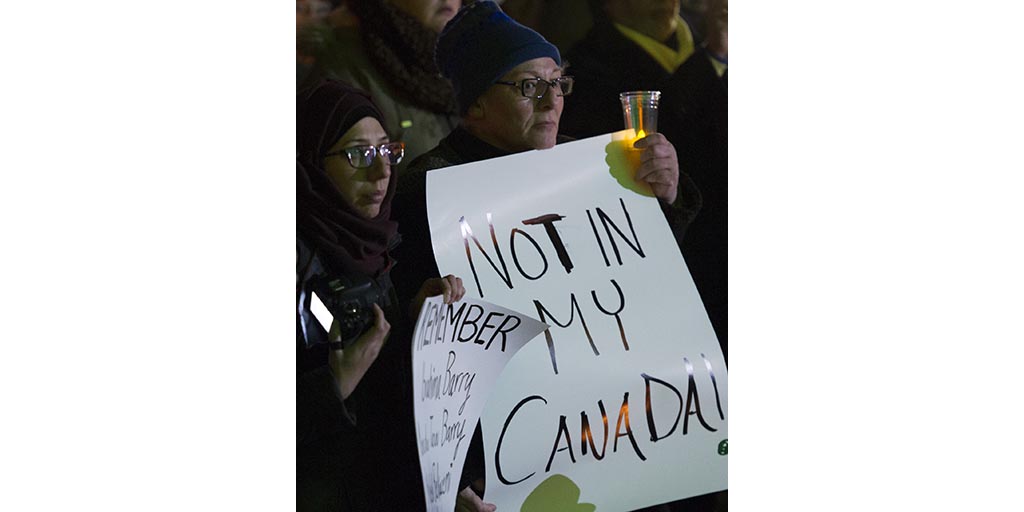Rumours of Grace: Shootings and accusations
 CREDIT: PREMIER OF CANADA ON FLICKR (CC BY-ND 2.0)
CREDIT: PREMIER OF CANADA ON FLICKR (CC BY-ND 2.0)A candlelight vigil was held for the six men who were killed and the close to two dozen that were wounded in a shooting at a Quebec City mosque.
Canadians place a high value on inclusion and diversity. Yet, the shooting at the Quebec mosque reminds us that not everyone embraces those values.
It would probably be too much to say that confidence in Canada’s ability to generate and sustain an inclusive society has been strongly shaken by the attack on Muslims in Quebec City. And to the credit of many in this country, thousands have reached out to Canada’s Muslim communities.
Nevertheless, an act like this shooting does raise questions about the ease with which forces of rejection and hatred can rise to the surface.
As it turns out, shooters who commit mass killings often act alone. But on closer examination they do not. Like-minded people, some of whom make public the views that the shooters themselves hold, support them.
First, there is good reason for the tide of compassion being expressed by the people of this country. The opening passages of the Bible reveal that the whole human family is a creation of God. The figures of Adam and Eve may be symbols of the first humans, but they tell a non-symbolic and essential truth: we are all created by God as members of the one human family.
How does it come about then that acts of violence arise which rip apart the human community?
Anthropologists, social workers, historians and psychologists have insights into why we are so adept at hatred. However, those same opening passages of the Bible present another, and I would say, deeper answer. Somehow, from the beginning, we have agreed to partner, perhaps not altogether consistently, but nevertheless, substantially, with evil, with darkness.
In the biblical story of the “fall of humankind” evil is symbolized by a talking animal: a lizard about-to-become a snake. The source of evil turns out to be not some impersonal dark force, but personal. It talks. It persuades and seduces its listeners.
Further along the biblical narrative this personal source receives a name: Satan. The word has a meaning: accuser.
And perhaps this name reveals how violence towards the “other” in our world arises. We listen to voices, thoughts and influences that accuse others of being evil. The talking lizard made a good start. It persuaded Eve and Adam that God himself was miserly; that he held back his riches from the humans he created. In other words, it accused God.
We can see then that these two strands run parallel. We side with Satan. We level accusations against others.
I have noticed families torn apart by inheritances and money, each member suspicious that some got more than they deserved. Perhaps you have heard people gossip about each other or lambast political opponents.
It goes like this: We feel insecure, offended or threatened. Next, we discover that there is a person, a group or a movement that is to blame for our difficulty. It is a small step from there to identify them as the enemy.
Soon a word comes to mind that serves to label the enemy. There are many to choose from: liberal, conservative, weakling, bully, liar, white supremacist, thief, Democrat, hoarder, Christian, capitalist, feminist, wasteful spender of public funds, Republican, misogynist, Nazi, gay, idiot, criminal, homophobic, a-hole, Muslim, child molester, wench, small-minded, fundamentalist, cheater, stupid driver, etc.
Is there anyone who hasn’t used accusatory labels on others, out loud, online or silently where no one will notice? Maybe in this regard we are uncomfortably more like the Quebec shooter than we care to admit.
If it is becoming increasingly difficult to sustain a diverse and inclusive society, perhaps the real problem is not with others. Maybe the real problem is right there in every human heart.
Jesus Christ came with a message from God for the whole human family he created. And key to that message is this: Love your enemy. No accusatory labels. Love your enemy.
Editorial opinions or comments expressed in this online edition of Interrobang newspaper reflect the views of the writer and are not those of the Interrobang or the Fanshawe Student Union. The Interrobang is published weekly by the Fanshawe Student Union at 1001 Fanshawe College Blvd., P.O. Box 7005, London, Ontario, N5Y 5R6 and distributed through the Fanshawe College community. Letters to the editor are welcome. All letters are subject to editing and should be emailed. All letters must be accompanied by contact information. Letters can also be submitted online by clicking here.














